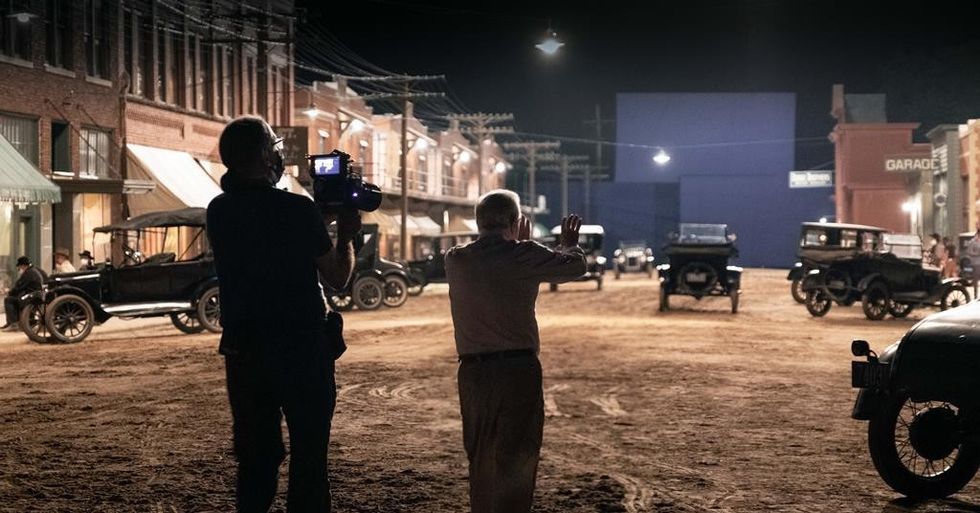How to Succeed as an Artist and Filmmaker, the David Bowie Way
What can filmmakers learn from master showman David Bowie?

Months after his death, the life and works of Ziggy Stardust himself are still being analyzed and pored over. Evan Carmichael's video below distills his lessons for success in Bowie's own words, and our top three apply directly to filmmakers.
Be Adventurous
For much of the sixties, Bowie struggled to find a name for himself; instead of being a trendsetter, he was a trend-follower. This all changed with his decision to drop out of the London scene and study mime in Paris with the legendary Lindsay Kemp. Bowie used his time with Kemp wisely; it inspired him to bring theatricality to rock n' roll in a way that would change the world.
Find Your Creative Process
Bowie experimented with different methods in his writing process. From William S. Burroughs, he took the idea of the cut-up (an idea that Burroughs had taken from his friend):
In an interview that Bowie gave for the book In Their Own Words: Songwriters Talk About the Creative Process, Bowie also discussed the importance of both keeping a "beginner's mind," and imposing limitations on yourself:
To allow the accidental to take place is often very good...Maybe I’ll write out five or six chords, then discipline myself to write something only with those five or six chords involved. So that particular dogma will dictate how the song is going to come out, not me and my sense of emotional self. Of course, I’ll cheat as well...I’ll allow myself to restructure it a bit, if I think, well, that could be so much better if it went to F-sharp [laughs], or something like that. But to define the rules, then take it as far as you can go with that little rule, then break it, I find is really a way of breaking writer’s blocks as well.
Do What You Like Doing
His time with Kemp also inspired Bowie to adopt personas, the first of which was Ziggy Stardust (here in a rarely seen film from legendary documentarian D. A. Pennebaker):
After the glam rock of Ziggy, Bowie became infatuated with the sound of Philly Soul and, recruiting old friend John Lennon and new singer Luther Vandross, he achieved his first American crossover success with his album Young Americans and its single "Fame." The song was so big that it got Bowie a spot on the show Soul Train as one of the first white performers on the show.
He even had a pretty cool career as an actor, starting in 1967 with this lost short film (it was only screened once, and resurfaced in March):
He worked with Nicolas Roeg in The Man Who Fell to Earth, appeared in Jim Henson's iconic Labryinth, and also played historical figures in Julian Schnabel's Basquiat(as a pitch-perfect Andy Warhol), and as a final role, a turn as iconoclastic genius Nikola Tesla in Christopher Nolan's The Prestige:
David Bowie a possessed a titanic and synthetic originality (He took from everywhere but made it his own, giving proof to the oft-misquoted T.S. Elliot line about mediocrity borrowing and genius stealing.) He brought theater into rock and roll, rock and roll into acting, and a craftsmanship borne of strict discipline to everything he did, yet his corpus was fully his own.
Bowie's influence will be felt for many years, if not generations. Listening to his songs today, it's fascinating how startlingly original they are in form, especially given how much he took from other sources. From dark pop songs to stuttering anthems, pitch perfect soul and beyond, his works were always his own, and for all his years of decadence, everything he did was borne of artistic rigor. Filmmakers and artists of any medium could take heart from his process.
As filmmakers, we can combine his lessons and work ethic to create a brand new one: consider exercising disciplined stylistic promiscuity in your work. Though, admittedly, this wordy phrase will probably never catch on, it could be a piece of filmmaking advice from Bowie himself.


 Go Behind the Scenes of the Filming of 'Killers of the Flower Moon'
Go Behind the Scenes of the Filming of 'Killers of the Flower Moon' BTS of Spike Jonze's Apple Ad Apple
BTS of Spike Jonze's Apple Ad Apple









